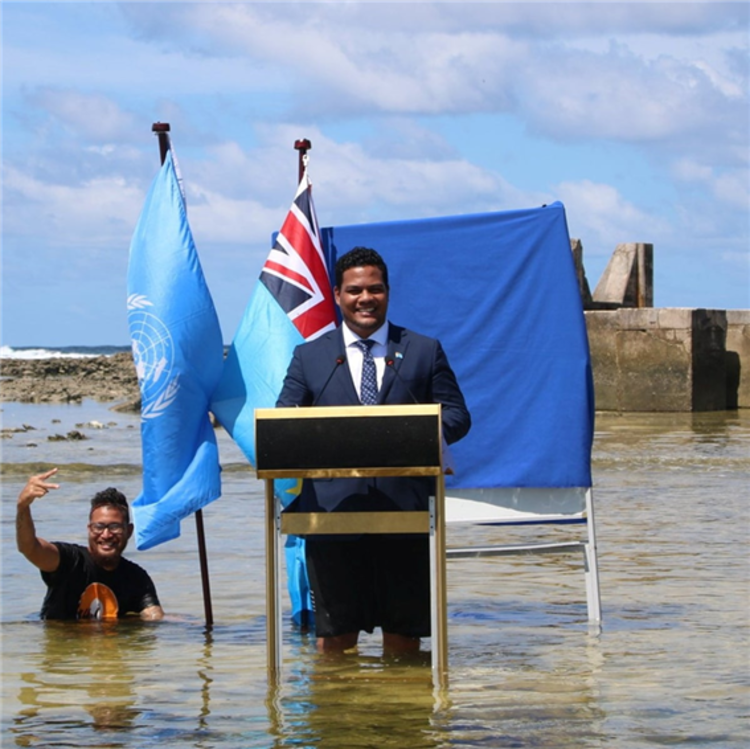

Simon Kofe, Tuvalu's Minister for Justice, Communication, and Foreign Affairs, gave a speech from the sea. Tuvalu is a country located in the South Pacific. In order to highlight the climate crisis and sea level rise, Minister Kofe presented a video clip of his address where he is seen knee-deep in seawater. A video of this speech was presented at COP26 (26th Conference of the Parties; UN Climate Change Conference).
For some time, most climatologists and ecologists have been emphasizing the seriousness of the climate crisis. In fact, climate phenomena are occurring more frequently than ever, and the crisis is appearing in various forms around the world. Professor Jaecheon Choi, a world-renowned biologist, was asked the following question in his lecture in the early days of the COVID-19 pandemic. "Is COVID-19 also related to the climate crisis?"
In response, the professor said, "Now I can say that the seriousness of the climate crisis has finally been recognized by the public. I feel that my efforts were not in vain, so I am happy to appreciate your question." Professor Choi went on to suggest that the underlying cause of COVID-19 may be the climate crisis.
"According to the University of Cambridge, 40 species of bats have moved their shelter from the tropics to temperate zones, especially in Southern China and Northern Laos, owing to global warming in recent decades. All bats originally inhabit tropical areas and each species has two or three kinds of coronavirus. A species of bat infected a wild animal called a pangolin with the coronavirus that has spread around the world. Humans live mainly in the temperate zone, so the physical distance from bats has narrowed. Humans cut down forests for their living space, and as a result, wild animals in the forest are more likely than expected to come out of the forest and meet humans. In China, the scales and nails of the pangolin have been regarded as a great restorative for the human body since ancient times. Because of that, the most likely theory is that COVID-19 may have spread to humans while people were in contact with the pangolins. The lesson of this story is that unless climate change stops, tropical bats will continue to migrate to temperate zones, which means they will endlessly bring the virus to humans. This is going to happen constantly and more frequently."
On May 19, 2020, the World Bank blog posted the article "Fighting Infectious Diseases." This article is about the relationship between infectious diseases and climate change. It explains that there are four reasons why the struggle against infectious diseases and pandemics is ultimately a response to climate change.
Firstly, changes in climate patterns increase the risk of infectious diseases. Diseases in tropical and subtropical regions are spreading to temperate and mountainous regions due to rising temperatures and increased rainfall. Dengue fever occurred in only nine countries until 1970, but it is now reported in 100 countries around the world.
Secondly, air pollution will help the virus spread more easily through the air and make it more deadly. Studies have shown that particles in polluted air act as a medium for the spread of the COVID-19.
Thirdly, the melting of glaciers and unfreezing of permafrost soil has revived old diseases that had disappeared. This situation is caused by the rise in temperatures which is approximately three times faster than the global average in the polar regions. For example, RNA fragments of Spanish flu were found in animal carcasses in Alaskan's frozen soil. In addition, 28 new species of ancient viruses were found in a 50-meter-underground glacier in Tibet. These ancient viruses are unknown to the world of science, and modern humans do not have immunity to these pathogens.
Lastly, global warming can change viruses in the direction of crippling the human immune system. The possibility that pathogens will evolve to adapt to high temperatures due to global warming cannot be ruled out.
Rapid glacial melt in Antarctica and Greenland is one of the most serious impacts of climate change. From 1979 to 1990, only 40 gigatons of glacier ice melted. However, from 2009 to 2017, 252 gigatons of the glacier ice melted. 252 gigatons are equal to 252,000,000,000,000 kilograms. Sea levels rose 3.2 ml on average per year from 1993 to 2006, whereas they rose 5 ml on average per year from 2014 to 2019. The people of Tuvalu lost their country due to the rise of sea levels. People in Tuvalu will move to New Zealand and Australia after discussion with the governments of the two countries.
Choi sent a significant message in his lecture. He said "Korea had a history of being deprived of its sovereignty by Japan, so Korea can hate or try to make up with its counterpart. However, Tuvalu doesn't know whom they should blame for losing their country. Whom should they blame or reconcile with? They have not used refrigerators, air conditioners, or private vehicles. They emit little carbon, but they are about to lose their country. This story makes people who live in developed countries reflect for a moment, but none of them can easily give up the advantages of technology."
Both developing countries and developed countries are facing the climate crisis nowadays. There was a huge flood in Western Europe last year. It happened in Germany, Luxembourg, the Netherlands, and Belgium. These countries have the world's best drainage facilities, but they were tremendously deluged to the extent that the water distribution systems were overburdened. According to the international journal Geophysical Research Letters, Newcastle University found that storms, which have slowed down due to climate change, increase the amount of rainfall accumulated locally, increasing the risk of sudden flooding across Europe than normal annual precipitation. In other words, as storms that produce strong rain move more slowly due to climate change, extreme flooding can increase like this heavy rain in Germany and Belgium.
The amount of carbon dioxide produced by wildfires is enormous. In the summer of 2019, 50 megatons of carbon dioxide were absorbed into the atmosphere during June of the year due to forest fires in the Arctic region. The Australian bushfires from September 2019 to March 2020 have released 900 megatons of carbon dioxide. Large wildfires that cause loss of wild habitats and accelerate global warming are much more likely to occur due to the climate crisis. David Romps, the University of Berkeley professor, said that global warming makes drought, heat, and dryness more severe, and this situation will increase the likelihood of wildfires.
South Korea, the world's 108th largest territory, was ranked fourth in per capita CO2 emissions in 2018. While other OECD countries have tended to reduce their carbon emissions, Korea has shown a 24.6% increase from 2007 to 2017. In the "Climate Change Response Index" released by the U.N. General Assembly for Climate Change in 2019, Korea ranked 58th out of 61 countries. In 2020, an abnormal climate phenomenon came
to our country in the form of a massive monsoon that lasted for 54 days. On August 9, 2022, for the first time in 80 years, record heavy rain of up to 400 mm fell in the central region. In Seoul, five people died and four people went missing, including a district office employee who was working on restoration.
Professor Choi suggested a four-step solution to the climate crisis. The main actors for this solution are international organizations, countries, companies, and individuals. He stressed the importance of the link between the four entities.
First, the role of international organizations is to convene meetings of representatives from each country to discuss and find solutions that every country can agree on. The consultation process within international organizations is very slow, and it is difficult to reach a conclusion. Nevertheless, it is important to constantly discuss the issues. Chairman Hoesung Lee, who has been the sixth chairman of the IPCC since October 2015, reached a significant agreement at the 2018 Climate Change Response Conference in Songdo, Incheon. The constant discussion among world leaders of climate change was the idea of somehow reducing the average temperature rise by less than two degrees during the 21st century. Most biologists predict that if the Earth's average temperature rises by 2 degrees, nearly half of the biodiversity could disappear, and human life would never survive this. However, Dr. Lee persuaded representatives from 160 countries to a goal of lowering by 1.5 degrees at the meeting in 2018.
Second, a country should implement climate policies that its citizens can agree on. A nation will always think of its own interests in diplomacy, but the climate crisis is an urgent problem. Therefore, a country must constantly think about the answer to the question 'Which countermeasures and solutions are the wisest to the climate crisis?' For example, on December 7, 2020, South Korea's government announced the "2020 Carbon Neutrality Promotion Strategy." The strategy includes three major policy directions, which are lowering carbonization of economic structure, creating a new and promising low-carbon industrial ecosystem, and fair transition to a carbon-neutral society. The government also added that it would implement policies with a "3+1" strategy that adds "strengthening carbon-neutral institutional foundation."
Third, companies are the fastest and most practical players of this four-step solution. Since global investment companies declared they would not invest in corporations that do not operate ESG (Environmental, Social, and Governance) standards, ESG has become a prerequisite, not an option. As a result, it seems that companies will not go against the global trend. It is expected that if companies change, many individuals will naturally follow them and respond to the climate crisis.
Finally, the most important entity is the individual. Consuming eco-friendly products, reducing excessive air conditioning and heating, and maintaining proper indoor temperatures, recycling products, reducing disposable consumption, and using public transportation can be ways for protecting the Earth. Although the activities listed above might have a marginal effect on the climate crisis in number, they will be useful as social trends.
If individuals' eco-friendly consumption patterns become social trends, companies will change according to the desires of consumers. After companies change, it becomes easier for countries to respond to the climate crisis, and if countries participate in active cooperation, international organizations can reach amicable agreements.
To make the Earth a sustainable place and pass it down to future generations, we must make tremendous effort.
Reporter,
Seunghoe Koo rokeet@seoultech.ac.kr


 Comment 0
Comment 0 Posts containing profanity or personal attacks will be deleted
Posts containing profanity or personal attacks will be deleted